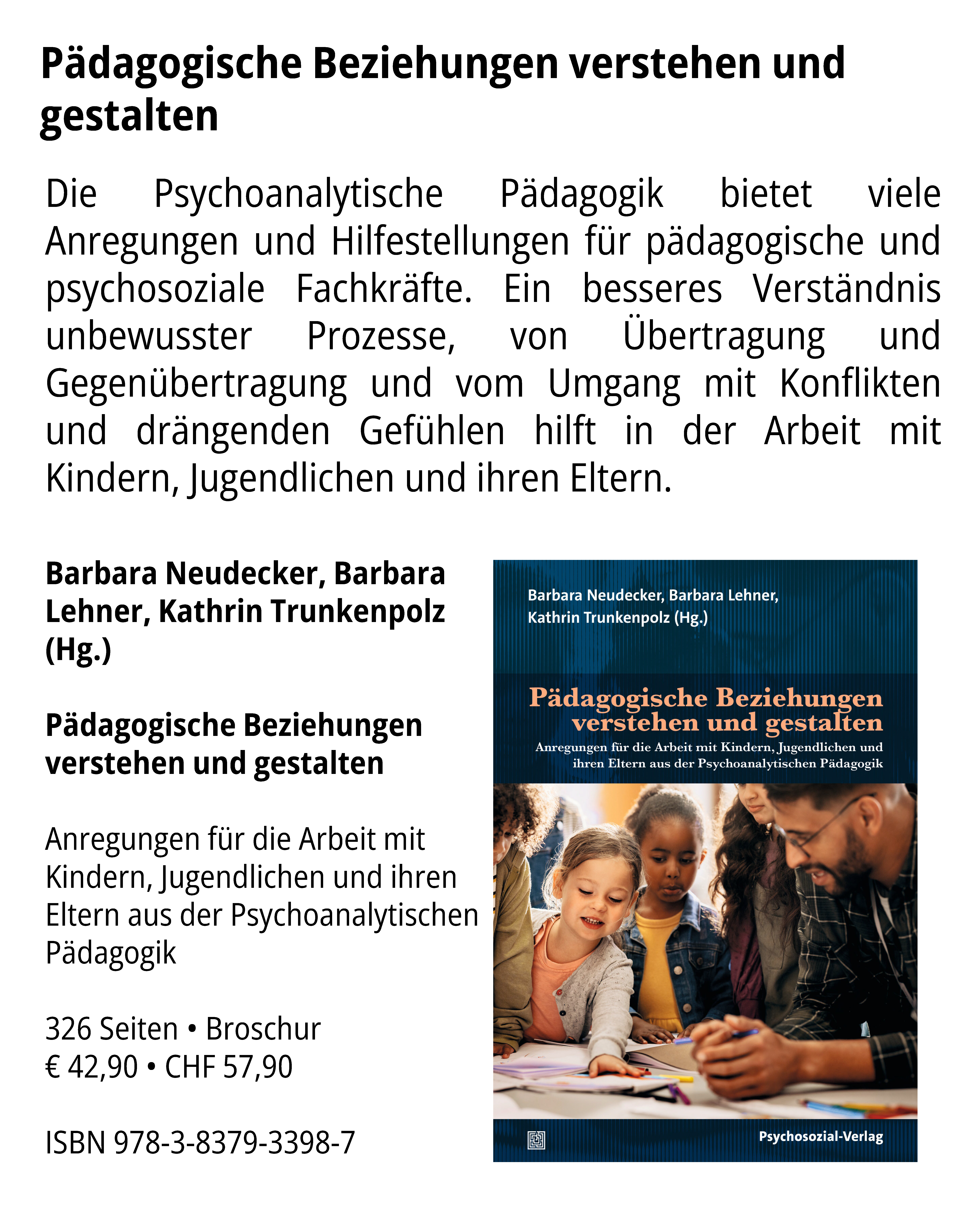Übers Sterben reden
Organisationsethische Fragen in der Begleitung von Menschen mit Behinderungen am Lebensende
DOI :
https://doi.org/10.57161/z2023-04-06Mots-clés :
déficience intellectuelle, polyhandicap, mort, soins palliatifs, autodétermination, éthiqueRésumé
Cet article traite de l'accompagnement des personnes en situation de handicap en fin de vie. Les résultats du projet « Palliative Care und hospizliche Begleitung von Menschen mit geistiger und schwerer Behinderung » (« Soins palliatifs et accompagnement institutionnel des personnes ayant une déficience intellectuelle et un polyhandicap ») mettent en évidence l'importance de la culture organisationnelle des institutions résidentielles sur la participation. Les expériences du personnel spécialisé ainsi que des résidentes et résidents montrent comment composer avec le consentement et la capacité à consentir. L'article inscrit cette question dans le cadre des réformes juridiques initiées dans différents pays par la Convention des Nations Unies relative aux droits des personnes handicapées.
Références
Bielefeldt, H. (2017). Menschenwürde und Autonomie am Lebensende. Perspektiven der internationalen Menschenrechte. In C. Welsh et al. (Hrsg.). Autonomie und Menschenrechte am Lebensende (S. 45–66). transcript.
Bigby, C., & Douglas, J. (2016). Support for decision-making – A practice framework. La Trobe University. www.supportfordecisionmakingresource.com.au/
Bundesamt für Gesundheit (BAG) (Hrsg.) (2020). Bessere Betreuung und Behandlung von Menschen am Lebensende. Bericht des Bundesrates. https://www.bag.admin.ch/bag/de/home/strategie-und-politik/nationale-gesundheitsstrategien/strategie-palliative-care.html#-309017583
Bundesamt für Gesundheit (BAG) & Schweizerische Konferenz der kantonalen Gesundheitsdirektorinnen und -direktoren (GDK) (2012). Nationale Strategie Palliative Care 2013–2015. Bilanz «Nationale Strategie Palliative Care 2010–2012» und Handlungsbedarf 2013–2015. Bern. http://www.bag.admin.ch/bag/de/home/strategie-und-politik/nationale-gesundheitsstrategien/strategie-palliative-care.html
Bundesministerium für Gesundheit (2016). Hospiz- und Palliativgesetz. Bessere Versorgung schwerstkranker Menschen. https://www.bundesgesundheitsministerium.de/fileadmin/Dateien/5_Publikationen/Gesundheit/Flyer_Poster_etc/Hospiz-_und_Palliativgesetz.pdf
Dasch, B., Blum, K., Gude, P. & Bausewein, C. (2015). Place of death: trends over the course of a decade. A population-based study of death certificates from the years 2001 and 2011. Deutsches Ärzteblatt International, 112 (29–30), 496–504. https://doi.org/10.3238/arztebl.2015.0496
Dunkley, S. & Sales, R. (2014). The challenges of providing palliative care for people with intellectual disabilities: a literature review. International Journal of Palliative Nursing, 20 (6), 279–284. https://doi.org/10.12968/ijpn.2014.20.6.279
Großmaß, R. (2013). Ethical Reasoning – Ethik in der beruflichen Praxis. In R. Großmaß & R. Anhorn (Hrsg.), Kritik der Moralisierung (S. 209–226). Springer.
Kohn, N. A., Blumenthal, J. A. & Campbell, A. T. (2013). Supported Decision-Making: A Viable Alternative to Guardianship? Penn State Law Review, 117 (4), 2013. http://dx.doi.org/10.2139/ssrn.2161115
Lachwitz, K. (2013). Funktion und Anwendungsbereich der «Unterstützung» («support») bei der Ausübung der Rechts- und Handlungsfähigkeit gemäß Artikel 12 UN-BRK – Anforderungen aus der Perspektive von Menschen mit geistiger Behinderung. In V. Aichele, T. Degener, K. Lachwitz, L. Krappmann, H. Loytved, R. Northoff (Hrsg.), Das Menschenrecht auf gleiche Anerkennung vor dem Recht: Artikel 12 der UN-Behindertenrechtskonvention (S. 67–99). Nomos.
Naef, J., Baumann-Hölzle, R. & Ritzenthaler-Spielmann, D. (2012). Patientenverfügungen in der Schweiz (Basiswissen Recht, Ethik und Medizin für Fachpersonen aus dem Gesundheitswesen). Schulthess Juristische Medien.
Ritzenthaler-Spielmann, D (2017). Lebensendentscheidungen bei Menschen mit einer kognitiven Beeinträchtigung. Klinkhardt.
Schäper, S. (2018). Einwilligung als Befähigungsprozess. Kritische Hinweise zur Praxis der Beteiligung von Probandinnen mit kognitiven Beeinträchtigungen in Forschungsprojekten. Behindertenpädagogik, 57 (2), 134–146.
Tuffrey-Wijne, I. (2003). The palliative care needs of people with intellectual disabilities: a literature review. Palliative Medicine,17 (1), 55–62. https://pubmed.ncbi.nlm.nih.gov/12597467/
Tuffrey-Wijne, I. & McLaughlin, D. (2015). Consensus Norms for Palliative Care of People with Intellectual Disabilities in Europe (European Association for Palliative Care (EAPC), Taskforce on People with Intellectual Disabilities). https://www.learningdisabilityanddementia.org/uploads/1/1/5/8/11581920/eapc-white-paper-id_full-version_april-2015.pdf
Übereinkommen über die Rechte von Menschen mit Behinderungen (Behindertenrechtskonvention, BRK), vom 13. Dezember 2006, durch die Schweiz ratifiziert am 15. April 2014, in Kraft seit dem 15. Mai 2014, SR 0.109.
Voss, H., Francke, A. L. & de Veer, A. (2021). Implementation and sustainment of palliative care innovations within organizations for people with intellectual disabilities: A multi-method evaluation, Disability and Health Journal, 14 (2). https://doi.org/10.1016/j.dhjo.2020.101049
Wicki, M., & Meier, S. (2015). Palliative Care für Menschen mit einer intellektuellen Behinderung. Handlungsbedarf und Maßnahmenvorschläge. Bundesamt für Gesundheit. https://www.bag.admin.ch/bag/de/home/das-bag/publikationen/forschungsberichte/forschungsberichte-palliative-care/intellektuelle-beeintraechtigung-und-palliative-care.html
Téléchargements
Publiée
Comment citer
Numéro
Rubrique
Licence
© Sabine Schäper 2023

Ce travail est disponible sous la licence Creative Commons Attribution 4.0 International .








